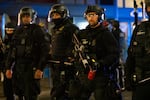Late Monday, a federal judge in Portland found the city in contempt of a court order that limited police officers’ use of tear gas and other crowd control devices during racial justice protests.
In his ruling, U.S. District Court Chief Judge Marco Hernandez said that, on June 30, the city violated his order several times. The order, issued on June 26, mandated police limit their use of tear gas and other crowd control devices to instances in which the lives and safety of police or members of the public were at risk. It also said that such devices “shall not be used” against people engaged in passive resistance.
Related: Opinion and Order of U.S. District Court Judge Marco Hernandez
Hernandez looked at several instances during a protest on June 30 outside the Portland Police Administration building and found three violations of the order he’d issued four days earlier.
In his 22-page ruling, Hernandez said the events of the last year, including George Floyd’s killing by police in Minneapolis, have brought thousands out into Portland’s streets, demanding change from public officials. While many have been peaceful, he wrote, many “devolve into chaos” later in the night.
“Individuals in crowds of otherwise peaceful protestors and activists have lit fires and launched bottles, cans, rocks, and fireworks from great distances at police officers,” Hernandez wrote in his Nov. 30 ruling. “Officers have responded with significant force in wielding batons against protestors and deploying scores of less-lethal munitions, including CS gas [tear gas]. Both sides have caused significant injuries.”
The lawsuit against the city was brought June 5 by the local civil rights group Don’t Shoot Portland and three named protesters. In October, Hernandez heard oral arguments in the case.
“We appreciate the court’s findings that PPB’s excessive force against those protesting in support of Black lives and against police brutality is unlawful and unacceptable,” said Ashlee Albies, one of the attorneys representing the group and individuals.
Attorneys representing the city in the case could not immediately be reached for comment.
The order addressed specific altercations between police and protesters on the evening of June 30 when some 200 to 250 protesters peacefully gathered in Peninsula Park in North Portland before some protesters marched to the Portland Police Association building, the union headquarters for police officers. Protesters were initially met by a line of Oregon State Police troopers in riot gear before Portland police showed up.
Hernandez said there were several instance where officers’ use of tear gas didn’t violate his order, including cases where protesters kicked tear gas canisters back at police.
But the judge identified three instances that evening that were in violation of his order. Two involved Officer Brent Taylor, who deployed 15 rounds from his less-lethal rifle related to two struggles over a banner carried by protesters.

Portland police officer Brent Taylor, right, holds an FN303 less-lethal launcher and a can of pepper spray while dispersing a crowd of protesters on August 12, 2020, in downtown Portland, Ore.
Jonathan Levinson / OPB
Hernandez found that in one instance Taylor wasn’t responding to aggressive actions when he fired his less-lethal rifle.
“Officer Taylor testified that he deployed his FN303 [less lethal rifle] against an individual holding onto a banner because he believed the banner would later be used as a weapon,” Hernandez wrote. “But none of the circumstances cited by Officer Taylor suggested that this banner was a weapon or would be imminently used by protestors as a weapon. Police officers had ample opportunity to observe the banner before Officer Taylor deployed his munitions.”
During another incident, Taylor fired at a protester who was trying to pull a person on roller skates back into the crowd. During the October hearing, Taylor testified he used his less lethal rifle because he thought officers were trying to make an arrest, while protesters were trying to unarrest the person on roller stakes.
“At no point does an officer declare that the skater is under arrest,” Hernandez wrote. “Though undoubtedly a chaotic and difficult moment for an officer in his position, the evidence shows that Officer Taylor did not deploy his FN303 [less lethal rifle] in response to active aggression or to prevent the use of a higher level of force.”
The final incident that violated Hernandez’ June order involved a protester who walked out of the crowd toward police and moved to grab an unknown object from the ground. A police officer fired several less lethal rounds.
“There was nothing in this moment to suggest that the protestor was grabbing an item with the intent to throw it at the police,” Hernandez wrote. “The individual moved slowly and was struck by a munition before they even had the object in their hands.”
Because the protester wasn’t being aggressive, the judge found, the actions by police violated his order.
Hernandez said any penalties against the city would be determined at a later date.
Portland Mayor Ted Wheeler issued a statement Tuesday morning, saying he was “committed to improving policing in our city.”
“The ruling is another important tool to help us respond to our community’s call for reforms of our public safety system,” Wheeler wrote, before thanking Portland police officers for “their service to the city in these difficult times.”
